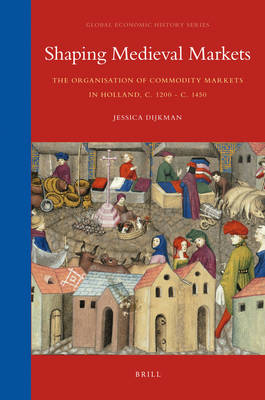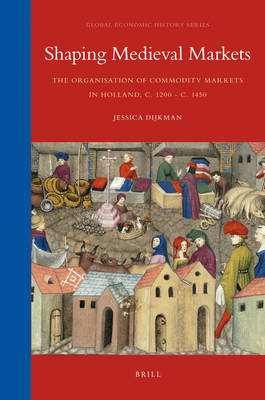
Je cadeautjes zeker op tijd in huis hebben voor de feestdagen? Kom langs in onze winkels en vind het perfecte geschenk!
- Afhalen na 1 uur in een winkel met voorraad
- Gratis thuislevering in België vanaf € 30
- Ruim aanbod met 7 miljoen producten
Je cadeautjes zeker op tijd in huis hebben voor de feestdagen? Kom langs in onze winkels en vind het perfecte geschenk!
- Afhalen na 1 uur in een winkel met voorraad
- Gratis thuislevering in België vanaf € 30
- Ruim aanbod met 7 miljoen producten
Zoeken
Shaping Medieval Markets
The Organisation of Commodity Markets in Holland, C. 1200 - C. 1450
Jessica Dijkman
€ 297,95
+ 595 punten
Omschrijving
The late Middle Ages witnessed the transformation of the county of Holland from a peripheral agrarian region to a highly commercialised and urbanised one. This book examines how the organisation of commodity markets contributed to this remarkable development. Comparing Holland to England and Flanders, the book shows that Holland's specific history of reclamation and settlement had given rise to a favourable balance of powers between state, nobility, towns and rural communities that reduced opportunities for rent-seeking and favoured the rise of efficient markets. This allowed burghers, peasants and fishermen to take full advantage of new opportunities presented by changing economic and ecological circumstances in the late fourteenth and early fifteenth centuries.
Specificaties
Betrokkenen
- Auteur(s):
- Uitgeverij:
Inhoud
- Aantal bladzijden:
- 464
- Taal:
- Engels
- Reeks:
- Reeksnummer:
- nr. 8
Eigenschappen
- Productcode (EAN):
- 9789004201484
- Verschijningsdatum:
- 11/08/2011
- Uitvoering:
- Hardcover
- Formaat:
- Genaaid
- Afmetingen:
- 165 mm x 246 mm
- Gewicht:
- 884 g

Alleen bij Standaard Boekhandel
+ 595 punten op je klantenkaart van Standaard Boekhandel
Beoordelingen
We publiceren alleen reviews die voldoen aan de voorwaarden voor reviews. Bekijk onze voorwaarden voor reviews.









